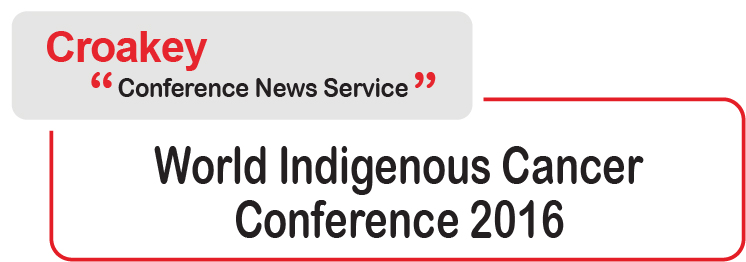Marie McInerney writes:
Efforts to reduce the incidence of cancer in Indigenous communities across the globe will be on the agenda of the first international conference of its type, to be held in Brisbane this week.
Hosted by the Menzies School of Health Research, in partnership with the International Agency for Research on Cancer (IARC), the theme of the inaugural World Indigenous Cancer Conference is ‘connecting, communicating, and collaborating’.
The experiences of consumers and how they can inform prevention and treatment strategies also will be a major focus.
Among more than 300 delegates from around the world will be Indigenous research leaders from Australia, New Zealand, the United States, Canada and beyond. Presentations will range from the incidence and mortality of cancer among the Greenlandic Inuit through to oral cancer among the Mullu Kuruma, Paniya and Kattunaikka tribes of India.
The three-day conference program (April 12-14) will look across the entire cancer continuum, from cancer prevention through to end of life care for Indigenous communities across the world.
Its aim is to reduce Indigenous cancer disparities, by bringing together Indigenous communities and experts to discuss the latest findings in the field, to stimulate international collaborations and to encourage high quality cancer research.
While the full program commences on Tuesday, the conference kicks off on Monday with the Racism and Health Workshop – Learnings for Cancer hosted by keynote speaker Professor David R Williams, who is the co-leader of the Cancer Risk Reduction and Disparities Program at Harvard University, and Dr Naomi Priest from Australian National University.
It will discuss the multiple ways in which racism influences health and health inequalities, with particular implications for Indigenous cancer research, policy and practice, and look to evidence regarding promising interventions to reduce racism and its harmful health effects.
See some good pre-workshop reading suggestions from Naomi Priest here:
As well as performing at the conference dinner, legendary Indigenous singer-songwriter Archie Roach will participate in the Wellness and Survivorship Plenary session, talking about ‘the patient and doctor conversation’. In recent years, he has suffered a stroke and had half of his lung removed, after he was diagnosed with the early stages of lung cancer.
A Yarning Circle will also feature throughout the conference as a space for stories about cancer survival, cancer care and screening services, health and wellbeing programs, cancer research and education programs for Indigenous people internationally.
Menzies co-hosts the National Indigenous Cancer Network (NICaN), which works to translate Indigenous cancer research into practice so that what’s known about cancer is available for use by people with cancer, their families, practitioners, policy makers and researchers.
NICaN ambassadors and Aboriginal community-controlled health services have been involved in developing the three-day Yarning Circle program.
A major focus of Menzies research is on improving Indigenous cancer patients’ experiences through their cancer journey and cancer outcomes. It says:
“Navigating one’s way through the health care system can be arduous and fraught with uncertainty and fear for any cancer patient.
This common problem can be exacerbated for an Indigenous person. Indigenous adult cancer patients report substantial unmet supportive care needs, including provision of transport and appropriate travel arrangements, suitable accommodation for both the patient and their support person and extra psychological support.”
Other keynote speakers and presenters include:
- Professor Tom Calma AO – Chancellor, University of Canberra and National Coordinator of Tackling Indigenous Smoking (Australia)
- Professor Richard Sullivan – Professor of Cancer & Global Health at Kings College London, Director at the Institute of Cancer Policy (UK)
- Dr Linda Burhansstipanov – Director of Native American Cancer Research (US)
- Dr Chris Wild– Director of International Agency for Research on Cancer (France)
- Professor Helen Zorbas AO – CEO of Cancer Australia (Australia)
- Associate Professor Gail Garvey –Principal Research Fellow at Menzies School of Health Research (Australia)
Garvey, who is #WICC2016 Committee Chair, said cancer has been largely overlooked among Indigenous populations globally, despite research showing they have significantly greater mortality and lower cancer survival rates.
Cancer is the second leading cause of death among Aboriginal and Torres Strait Islander people and is responsible for more deaths each year than diabetes and kidney disease.
Menzies reports that while the death rate for all cancers combined is significantly higher for Indigenous Australians than other Australians, Indigenous Australians have a lower incidence of cancers commonly diagnosed in the non-Indigenous population and a higher incidence of less common cancers. These include cervical, liver, uterus, lung and other smoking-related cancers. For example, the incidence rate of cervical cancer is almost three times higher for Indigenous Australians than for non-Indigenous Australians (18 and 7 per 100 000, respectively).
A number of key presentations at the conference will look at research behind those figures, particularly why, despite a similar overall incidence of cancers, Indigenous people have higher mortality rates than other Australians. Menzies says a number of factors may be behind the higher death rates, including later diagnosis, reduced uptake of or access to treatment, greater comorbidities, and higher rates of more aggressive cancers.
Ahead of the conference Garvey said:
Greater understanding of the burden of cancer among Indigenous populations is of major importance to public health given that poorer outcomes contribute to the lower life expectancies experienced by many Indigenous peoples.
WICC 2016 will provide opportunities to foster new collaboration, enhance capacity, and share knowledge and information about cancer and Indigenous people internationally.
• Marie McInerney is covering #WICC2016 for the Croakey Conference News Service. (Note: this post was expanded on 11 April).

<p><img class=”aligncenter size-full wp-image-37795″ src=”https://croakey.org/wp-content/uploads/2016/04/CROAKEYWorldIndigenousCancer_logo.jpg” alt=”CROAKEYWorldIndigenousCancer_logo” width=”746″ height=”262″ /></p>
